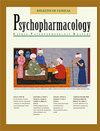Traumatic Experiences and Reduced Alcohol Self-efficacy in Alcohol Dependent Inpatients: Attentional and Autonomic Mediators
Q Medicine
Klinik Psikofarmakoloji Bulteni-bulletin of Clinical Psychopharmacology
Pub Date : 2015-12-01
DOI:10.5455/BCP.20150502072931
引用次数: 1
Abstract
ABS TRACT: Traumatic experiences and reduced alcohol self-efficacy in alcohol dependent inpatients: attentional and autonomic mediators Objective: Self-medication with alcohol has been documented among individuals exposed to chronic trauma who may be unable to resist urges to drink in high-risk situations. Persistent alcohol use can result in attentional bias (AB) toward alcohol cues and psychophysiological reactivity such as changes in cue-elicited heart rate variability (HRV). The present study tested the hypothesis that individual differences in alcohol AB and HRV mediate the association between lifetime exposure to traumatic events and alcohol-related selfefficacy among a sample of alcohol dependent adults in inpatient treatment. Method: This paper details a secondary data analysis from a sample of alcohol dependent adults (N = 58) who completed standardized psychosocial instruments, an affect-modulated cue reactivity protocol, and a spatial cueing task. Results: Path analyses indicated statistically significant direct effects of levels of lifetime trauma exposure on Low Frequency/High Frequency-HRV cue-reactivity, alcohol AB, and alcohol self-efficacy. A statistically significant indirect effect was found from lifetime trauma exposure to alcohol-related self-efficacy through alcohol AB. Conclusions: Results suggest that alcohol AB partially mediates the relationship between greater lifetime trauma exposure and reduced alcohol self-efficacy. Hence, alcohol dependent individuals with more extensive trauma histories may benefit from therapies aimed at increasing self-awareness and self-regulation of attentional and autonomic reactivity to prevent risk of relapse.住院酒精依赖患者的创伤经历和酒精自我效能降低:注意和自主神经介质
摘要:酒精依赖住院患者的创伤经历和酒精自我效能降低:注意和自主神经介质目的:在暴露于慢性创伤的个体中,酒精自我药疗已经被记录下来,这些个体可能在高风险情况下无法抵抗饮酒的冲动。持续饮酒可导致对酒精线索的注意偏倚(AB)和心理生理反应,如线索引起的心率变异性(HRV)的变化。本研究验证了酒精AB和HRV的个体差异介导了终身暴露于创伤性事件和酒精相关自我效能之间的关联。方法:本文详细分析了来自酒精依赖成人(N = 58)样本的二次数据,这些样本完成了标准化的心理社会工具、情感调节提示反应方案和空间提示任务。结果:通径分析表明,终生创伤暴露水平对低频/高频hrv线索反应性、酒精AB和酒精自我效能有统计学意义的直接影响。终生创伤暴露对酒精相关自我效能的间接影响在统计学上具有显著意义。结论:结果表明,酒精AB在终生创伤暴露增加和酒精自我效能降低之间具有部分中介作用。因此,具有更广泛创伤史的酒精依赖个体可能受益于旨在提高自我意识和自我调节注意力和自主反应性的治疗,以防止复发的风险。
本文章由计算机程序翻译,如有差异,请以英文原文为准。
求助全文
约1分钟内获得全文
求助全文
来源期刊
CiteScore
0.34
自引率
0.00%
发文量
0
审稿时长
6-12 weeks

 求助内容:
求助内容: 应助结果提醒方式:
应助结果提醒方式:


